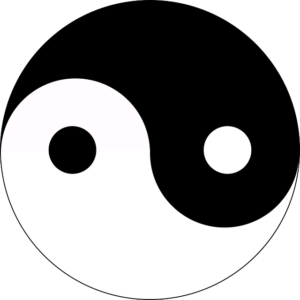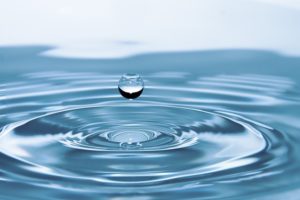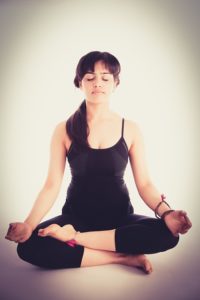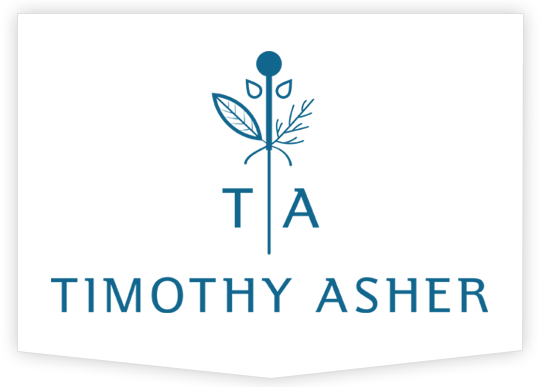Yin and Yang: Regaining the Balance

Acupuncture and Chinese medicine are rooted in the balance of Yin and Yang, commonly represented by this symbol.
There is a dynamic flow that continuously balances and rebalances these energies. In nature, we have the changing of the seasons. The weather turns from the cold winter to warm summer and then back to winter. The one season isn’t better than the other, they are just different, and nature needs both seasons for balance.
It is the same with our body and mind. There needs to be a balance between Yin and Yang to keep us healthy.
Differences between Yin and Yang
In Chinese medicine, on a very basic level, the Yin is the physical body: the flesh and bones, muscles, organs, etc. The things we can physically touch and see. The Yang is the invisible energy that sets it all in motion and enables us to think, breathe walk, talk, etc.

Sunset is a time when we get to observe the transition from a more Yang-dominant time to a more Yin-dominant one.
On the other hand, the Yin is the slow, dense, soft energy of rest and nourishment. When we are asleep or resting, the Yin predominates. With Yin and Yang, we need to look at each relative to the other. When it is night time and we are asleep, the Yin is more dominant, but that doesn’t mean the Yang is absent. Our heart still beats, and our breath still flows, just at a slower rate. The Yang is simply less dominant, relative to Yin.
We don’t find equilibrium unless both types of energy are present in the right balance at the right time. This equilibrium is highly dynamic and is constantly changing and shifting. There needs to be a balance between active and passive (rest). An excess or deficiency of one will harm the body and mind and result in disease. The stronger our overall health is, the easier it is for us to dynamically adjust this delicate balance and continue to be healthy, happy and comfortable in a broad range of environments and situations.
Yin and Yang in Health and Well-being
In Western medicine, we often overlook the causes of our ailments, such as our emotions, thought patterns, and unhealthy lifestyles, and instead treat the symptoms. But we need to take a step back and look at where our lifestyles may create health issues, both physical and mental. Chasing or suppressing symptoms doesn’t lead to true, long-term healing. In Traditional Chinese Medicine, we try to understand and address the root cause or causes of the problem instead. We look to see how factors like emotions, diet, and lifestyle choices can affect the delicate balance of Yin and Yang.
When there is an imbalance in health and wellbeing, it can be caused by either an excess or deficiency of Yin or Yang which can affect any aspect of the physical and mental health.
Signs of a Yang Deficiency
When we have too little yang (relatively),we lack the energy of activity. We might be tired all the time and have problems with digestion or motivation for example. We might find it hard to focus, and on a more macro scale, might easily lose sight of our goals and lack inspiration to go after the things we want in our career or personal life. Here are some common signs of a relative Yang deficiency:
- Fatigue or low energy
- Overweight
- Poor digestion
- Feeling cold all the time
- Feeling weak and lifeless
- Lack of confidence
- Low self-esteem
- Feelings of hopelessness
- Hypothyroidism
Signs of a Yin Deficiency
When we have too little Yin energy, we often lose the ability to adapt to circumstances, access our creativity, and are less receptive to others. Too little yin also causes premature aging in our physical bodies. Here are some signs of a yin deficiency:
- Sleeplessness/insomnia
- Anxiety
- Hot flashes/feeling hot
- Feeling wired/hyperactivity
- Feelings of frustration
- Being overly competitive
- Feeling overwhelmed
- Anger and aggression
- Inability to relax
- Being too critical and judgmental towards others and oneself
- Feeling burnt out
- Hyperthyroidism
How to Regain Balance between Yin and Yang

The first step in restoring harmony is to practice mindful awareness and to notice your life habits and body symptoms. Pay attention to your thoughts, feelings, and behavior. Slow down and take the time to notice the different manifestations of Yin and Yang in your life and the world in general. By observing closely and tuning in to the signs of imbalance, it will help you to make better choices that are more harmonious with your specific imbalance.
Our modern society, especially in San Francisco, is very yang and active. American society in general is very Yang. As a culture, Americans work long days and hardly take vacation. We are often overtired from working long hours in stressful jobs, and trying to sustain it with caffeine and sugar. And then instead of resting in our off time, we party and play hard in the evenings or on weekends.
There’s nothing wrong with living an active and social lifestyle, so long as there is a balance. Most of us need more yin time. We need more resting, unplugging, and doing less, or more doing nothing. For many, that means actually learning how to do nothing and just be. That’s something we are rarely taught in this society.
Here are some ways which can help you to get more Yin time:

Perfect yin time!
- Getting a deeper and more restful sleep (make good sleep a priority)
- More resting and unwinding during off times
- Using devices and electronics less (especially in the evenings and over the weekend)
- Meditation
- Taking a bath or shower
- Limiting time on social media and television watching
- Going for a 20-minute brisk walk each day
- Cooking your own food
- Eating slowly and savoring your meal
- Going for acupuncture treatment
- Getting a massage or bodywork
- Joining a yoga (preferably not heated) or Tai Chi class
- Spending time with family and friends just talking and laughing
- Cuddling with your pet or partner
If you need any help rebalancing, feel free to get in touch with me. I can give you great tips on how to regain harmony, as well as treating your yin or yang imbalance with acupuncture and Chinese herbal medicine.





